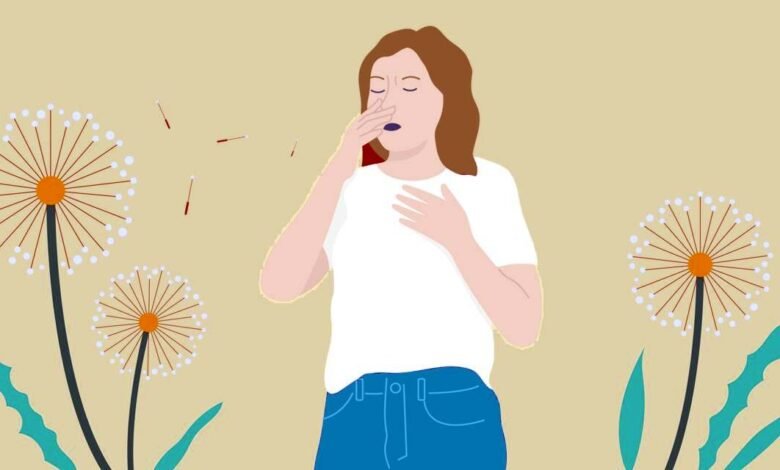How to Manage Pollen Allergies at Home in 2023

Pollen allergies can be quite bothersome, affecting a significant portion of the population in 2023. Sneezing, itchy eyes, and a runny nose are just a few of the uncomfortable symptoms that individuals with pollen allergies experience. Managing these allergies effectively at home is crucial for maintaining a good quality of life. In this article, we will discuss various strategies and tips on how to manage pollen allergies at home in 2023.
Pollen allergies, also known as hay fever or allergic rhinitis, occur when the immune system overreacts to pollen from trees, grasses, and weeds. As plants release pollen into the air, it can trigger allergic reactions in susceptible individuals. In 2023, the prevalence of pollen allergies remains significant, affecting millions of people worldwide. However, with proper management techniques, individuals can minimize the impact of pollen allergies on their daily lives.
Read More: 10 Reasons For Itchy Red Patches On The Skin
Understanding Pollen Allergies
To effectively manage pollen allergies, it’s important to understand their causes and symptoms. Pollen allergies are caused by an immune response to specific allergens present in pollen grains. When a person with allergies inhales or comes into contact with these allergens, their immune system reacts by releasing histamines, leading to symptoms such as sneezing, itching, nasal congestion, and watery eyes.
Identifying the specific allergens that trigger your symptoms is crucial in managing pollen allergies. Different plants release pollen at different times of the year, so being aware of which pollens you are allergic to can help you plan and take preventive measures accordingly.
Creating an Allergy-Friendly Home Environment
One of the primary steps in managing pollen allergies at home is creating an allergy-friendly environment. Regular cleaning and dusting help remove pollen particles that may have entered your home. Use a damp cloth or microfiber duster to trap the pollen instead of simply spreading it around.
Investing in air purifiers and filters can significantly improve indoor air quality by capturing pollen and other airborne allergens. Ensure that you clean or replace filters regularly to maintain their efficiency. Additionally, keeping windows closed during peak pollen seasons can prevent the entry of pollen into your living spaces.
Minimizing the number of indoor plants and flowers can also help reduce pollen exposure indoors. While plants provide aesthetic value, they can release pollen that triggers allergies. Opt for plants that are less likely to produce airborne allergens, such as ferns or palms.
Pollen Allergy Prevention Tips
Prevention is key when it comes to managing pollen allergies. Checking daily pollen forecasts can help you plan your outdoor activities accordingly. On days when the pollen count is high, it’s best to limit your time outdoors, particularly during mid-morning and early evening when pollen levels are usually at their peak.
Wearing protective clothing, such as long-sleeved shirts and sunglasses, can create a physical barrier between your skin and allergens. This can prevent pollen from coming into direct contact with your body, reducing the chances of an allergic reaction. Additionally, showering and changing clothes immediately after spending time outdoors can help remove any pollen particles that may have settled on your body or clothing.
Natural Remedies for Pollen Allergy Relief
If you prefer natural remedies, several options may provide relief from pollen allergy symptoms. Nasal irrigation using saline solutions can help flush out pollen and mucus from your nasal passages, providing temporary relief. Over-the-counter antihistamines can also help alleviate symptoms such as sneezing, itching, and a runny nose.
Consuming local honey, obtained from bees that collect nectar from local flowers, has been suggested as a natural remedy for pollen allergies. It is believed that regular consumption of local honey can desensitize the body to pollen allergens over time. However, scientific evidence supporting this claim is limited.
Certain herbal remedies and supplements, such as butterbur and spirulina, have been proposed to reduce allergic reactions. Before using any herbal remedy or supplement, it’s important to consult with a healthcare professional, as they can interact with other medications or have side effects.
Managing Pollen Allergies with Medications
When natural remedies alone are not sufficient, allergy medications can provide relief from pollen allergy symptoms. Antihistamines, both over-the-counter and prescription-strength, are commonly used to manage allergic rhinitis. They work by blocking the effects of histamine, thus reducing symptoms like sneezing, itching, and a runny nose.
Decongestants can also help relieve nasal congestion associated with pollen allergies. However, they should be used cautiously, as prolonged or excessive use can lead to rebound congestion or other side effects. It’s best to consult with a healthcare professional before using decongestants.
Incorporating Diet and Lifestyle Changes
Certain diet and lifestyle changes may help manage pollen allergies. Consuming anti-inflammatory foods, such as fruits, vegetables, and omega-3 fatty acids, can support overall immune system health and reduce allergic reactions. On the other hand, it’s important to avoid trigger foods that may worsen allergy symptoms, such as processed foods, artificial additives, and foods high in histamines.
Regular exercise and physical activity can help improve overall respiratory health and strengthen the immune system. Engaging in activities like yoga or swimming can be particularly beneficial for individuals with pollen allergies, as they are less likely to trigger allergies.
Stress management techniques, such as meditation, deep breathing exercises, or engaging in hobbies, can help reduce the impact of stress on the immune system. Stress can exacerbate allergy symptoms, so finding effective ways to manage stress can contribute to better pollen allergy management.
Creating a Pollen-Free Bedroom
Having a pollen-free bedroom is essential for a good night’s sleep and to minimize exposure to allergens. Washing bedding frequently in hot water can help remove any pollen particles that may have accumulated. Using hypoallergenic pillowcases and mattress covers can create a barrier between you and allergens, reducing the chances of an allergic reaction.
Removing carpets and rugs from the bedroom can prevent pollen from getting trapped in the fibers. Opt for hardwood or tile flooring, which is easier to clean and less likely to harbor allergens. Additionally, choosing bedding materials that are specifically designed to reduce allergens, such as dust mite-proof covers or hypoallergenic bedding, can further minimize exposure to pollen.
Seeking Professional Help
In some cases, pollen allergies may require professional intervention. Allergy testing can help identify specific allergens that trigger your symptoms, allowing for targeted management strategies. Immunotherapy, such as allergy shots or sublingual tablets, can be recommended by allergists or immunologists for long-term management of pollen allergies. These treatments aim to desensitize the body to allergens, reducing the severity of allergic reactions over time.
If pollen allergies significantly impact your daily life and home management strategies are not providing sufficient relief, consulting with a healthcare professional is essential. They can provide personalized advice, prescribe medications if necessary, and guide you through advanced management options.
Conclusion
Managing pollen allergies at home in 2023 requires a multi-faceted approach that includes creating an allergy-friendly environment, taking preventive measures, exploring natural remedies, considering medication options, making diet and lifestyle changes, creating a pollen-free bedroom, and seeking professional help when needed. By implementing these strategies, individuals with pollen allergies can experience improved quality of life and better control over their symptoms.
Read More: Food Allergy Or Food Intolerance?
FAQs
Can pollen allergies be cured?
Unfortunately, there is no known cure for pollen allergies. However, with proper management techniques and personalized treatment plans, symptoms can be effectively controlled, allowing individuals to lead normal life.
Is it possible to develop pollen allergies later in life?
Yes, it is possible to develop pollen allergies at any age. While some individuals may experience symptoms from childhood, others may develop allergies later in life due to changes in their immune system or environmental factors.
Are pollen allergies more common in certain seasons?
Yes, pollen allergies are typically more common during spring and fall when trees, grasses, and weeds release their pollen. However, depending on the specific allergens that trigger your allergies, symptoms can vary throughout the year.
Can I still enjoy outdoor activities if I have pollen allergies?
Yes, it’s still possible to enjoy outdoor activities if you have pollen allergies. By following preventive measures, wearing protective clothing, and planning activities during low pollen count periods, you can minimize exposure and reduce the risk of allergy symptoms.
Are there any long-term effects of untreated pollen allergies?
Untreated pollen allergies can lead to chronic inflammation in the nasal passages and sinuses, which may increase the risk of developing sinus infections or asthma. It’s important to manage allergies effectively to prevent complications and maintain respiratory health.







